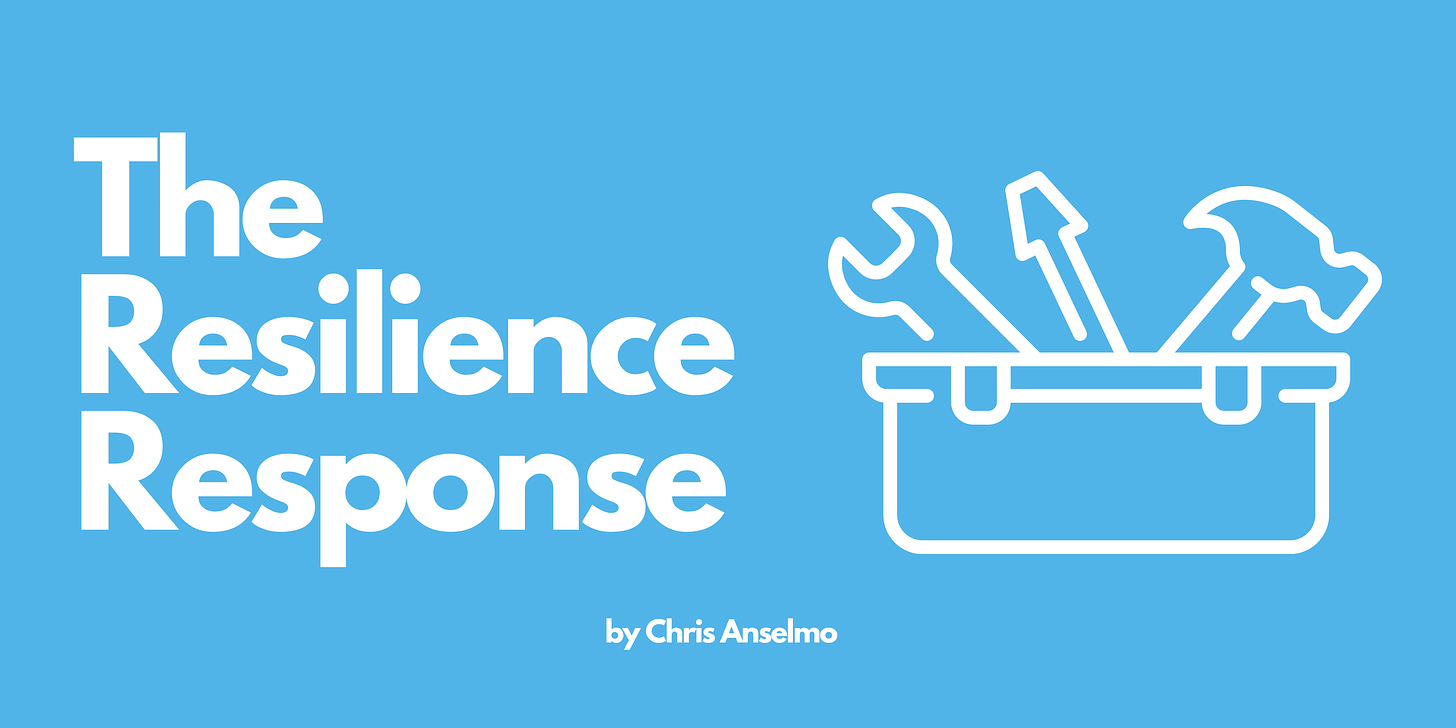The Resilience Response #1 - August 26, 2023
Process vs. outcome, embracing change, the benefits of a commonplace book, and more
Happy Saturday!
Welcome to the first edition of The Resilience Response, a newsletter that provides the tools and resources you need to face adversity with confidence.
Here are the resilience-themed categories you will find in each edition:
🔧 For the Toolkit: A strategy you can implement today.
🎙️ In the First Person: A unique perspective on facing life’s ups and downs.
📚 What’s Helped Me: An influence or resource that has helped me on my adversity journey.
✍️ Weekly Intention: A thought to consider in the upcoming week.
🎁 Outtakes and Extras: Any intriguing quotes, news stories or other items worth sharing.
Let’s get to it!
🔧 For the Toolkit: Focus on the process. Surrender the outcome.
When we set a goal or size up a challenge, we often place disproportionate emphasis on the outcome.
For example:
If we are diagnosed with a disease, we want to get better.
If we lose our job, we want to find another one as quickly as possible.
If we have an important exam, we want to pass it with flying colors.
Outcomes are crucial, no question. However, a given outcome is not always within our control. We can do everything right—make all the necessary lifestyle modifications, ace the job interview, prepare for the exam to the best of our abilities—and yet, sometimes it doesn’t work out.
Maybe we didn’t respond to a treatment. Maybe there was a more qualified candidate. Maybe there was a family emergency that distracted us on exam day. So many times, there are factors beyond our reach.
If the outcome fails to materialize, it doesn’t necessarily mean we did something wrong. Yet, we often heap blame on ourselves for our shortcomings. This only compounds our misery.
What can we do instead? Focus on the process—those incremental steps we can take to put ourselves in the best position possible to achieve our desired outcome. That’s all we can do.
When we focus on the process and surrender the outcome, we restore a sense of balance and perspective to our lives. We become aware of what is truly within our control. In many ways, it is freeing. We can look ourselves in the mirror at the end of the day and know we gave it everything we had.
If the outcome happens, great! If not, it doesn’t mean we’re a failure.
🎙️ In the First Person: Maya Shankar on embracing change
In her recent TED talk, cognitive scientist and award-winning podcast host Maya Shankar shares three ways we can embrace change to transform our lives. Using different examples, she illustrates how change can unlock new capabilities, clarify what we value, and help define ourselves in new, empowering ways. Change is scary, but it doesn’t have to be.
Shankar has personal experience with the fear and uncertainty of change. Growing up, she was on track to become a concert violinist only to experience an injury to her finger that ended her career before it began. Although a major setback, the injury ultimately guided Shankar down the fulfilling path she is on today.
“When an unexpected change happens to us, it can also inspire lasting change within us.”
📚 What’s Helped Me: Using a commonplace book

When my disease symptoms manifested in my early 20s, I took notes on every aspect of my health I could think of, from what I ate to the factors that contributed to my latest fall. These notes served as a way to better understand what was going on inside my body, and where I could devote my efforts to make a difference in how I felt. Over time, my note-taking has expanded to include research articles, inspirational quotes, personal finance tips, and more.
I would later learn that I was keeping a commonplace book, which MasterClass defines as “a system for writing down and sorting all manner of tidbits…that you might want to return to later.”
My commonplace book has transformed my life. By tracking everyday details over the last fifteen years, I have been able to figure out which lifestyle factors slow down my disease progression. In a surprising twist, these notes have also provided the raw material for my memoir, allowing me to remember details from a decade ago that I would have otherwise forgotten. I’ve also saved notes from dozens of articles and books that I frequently use for Hello, Adversity.
If you are dealing with a challenge, taking notes and saving helpful resources can prepare you to face it head-on. Important details no longer have to be forgotten or lost on Post-it notes. There are no set rules; just save what you feel is important. You can jot down leads you want to pursue or topics to research further.
You’ll be amazed how much easier it will be to make connections between data points and form new ideas based on what you’ve captured. It is these “a-ha!” moments that can change your life.
I like to use a digital note-taking app, as it can be easily searched and organized. I use Notion, but Evernote or another program works well too. If you prefer pen and paper, that is also fine. What matters is having a system that you will use.
If you’d like some note-taking inspiration, Jillian Hess’s Noted Substack provides great visual examples of how famous creatives have kept notes over the years. Here’s a recent piece on organizing quotations that I found fascinating.
✍️ Intention for the week ahead: What is your relationship with change?
Maya Shankar says that change is something we all dread. Change signifies uncertainty, and in many instances, loss. Yet, when we reframe change in a more productive light, it can transform our lives.
In the week ahead, take a few minutes to think about a major change you are currently going through. If the change makes you fearful, try to dig deeper to see how it could be a source of empowerment and growth. Is there a way you can use change to your advantage? If you need help getting started, consider the three examples Shankar provided.
If you are willing to share an example of a change you are dealing with, let me know in the comments. I will do the same!
🎁 Outtakes and Extras
I like this quote from Ralph Waldo Emerson:
“That which we persist on doing becomes easier, not that the nature of the task has changed, but our ability to do has increased.”
I gave a talk last week at a small biotech company. After the talk, I couldn’t help but marvel at how public speaking has become second nature to me. It wasn’t always this way! It has taken me 25 years and hundreds of hours of experience to get to this point.
What seems difficult today will get easier over time. Don’t get discouraged if you are struggling to master a skill. Competency doesn’t happen overnight.





My major change was my decision to leave my job at the beginning of August. For a long time, I have wanted to set out on my own to see if I could gain traction as a writer and public speaker. The decision was scary (still is!) but I am enjoying the challenge. I am trying to adopt an entrepreneurial mindset, which is a little tough since I hate self-promotion. But I am enjoying the learning process and building new skills. The change has certainly has clarified my values. I want to use my life experience to help others, and I feel that this is the best way to accomplish that.
Congrats on loving the speaking gigs, Chris! I'm sure that's incredibly exciting. For the most part, I embrace change, and what's next...except when the ripple effect proves annoying (like the new pizza place that opened on the corner that is totally screwing up life for those of us with street parking...and there are two other places open and ready for new business which will likely only make it worse, GAH!). Aside from that, I'm a true optimist. 🙄 xo